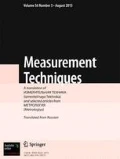Stephen Patoray

When the 2014 WMD topic was first proposed, I began to think about what the global energy challenge is, and the role that measurements and especially legal metrology play in it.
While measurements are central to most basic decisions on energy usage, there are many other aspects of the global energy challenge which are much more complex:
-
global population growth;
-
emerging economies;
-
complex technologies;
-
increasing consumer demands;
-
higher quality of life; etc.
These factors may result in significant increases in demand for all types of energy which in turn may result in environmental changes and pollution. This demand requires redistributing existing energy supplies, increasing energy production and developing alternative energies. It became clear to me that I needed to break this down into smaller, more manageable pieces of information so I could better understand the role of legal metrology.
I began to realize that no matter how complex this challenge seems to be, it comes down to individual choices regarding the energy we use in our daily lives. It makes no difference whether we are talking about national or local governments, large or small companies, organizations or individuals. However, to make good choices we need information, much of which is based on measurements. For the results of these measurements to be useful we must have confidence in the instruments and the processes used. To ensure this confidence, the instruments must comply with performance requirements laid down in internationally recognized written standards.
Many instruments under legal metrological control are linked to our consumption of energy:
-
some are directly linked, such as gas meters, electricity meters and fuel dispensers;
-
some are indirectly linked, such as the air pressure in the our car tires; and
-
others are linked to the consequences of energy production, such as pollution from power plants, exhaust emissions from our cars, and now, increasingly, the measurement of greenhouse gases.
The vital role that measurements and especially legal metrology play in this global challenge is now very clear to me.
As we join together to celebrate World Metrology Day, we should all be aware and be thankful that there are knowledgeable, highly skilled and dedicated people, not just in the legal metrology community but across the many businesses in the energy sectors, who are working every day to ensure that we have the systems in place to provide accurate, internationally accepted equipment and measurements. Thanks to these people we are all able to have confidence in the decisions we make with respect to all the measurements we need in order to address the global energy challenge.
Additional information
The International Bureau of Legal Metrology (BIML). Published in Izmeritel’naya Tekhnika, No. 5, p. 4, May, 2014.
Rights and permissions
About this article
Cite this article
Message from the BIML Director. Meas Tech 57, 478 (2014). https://doi.org/10.1007/s11018-014-0483-3
Published:
Issue Date:
DOI: https://doi.org/10.1007/s11018-014-0483-3

